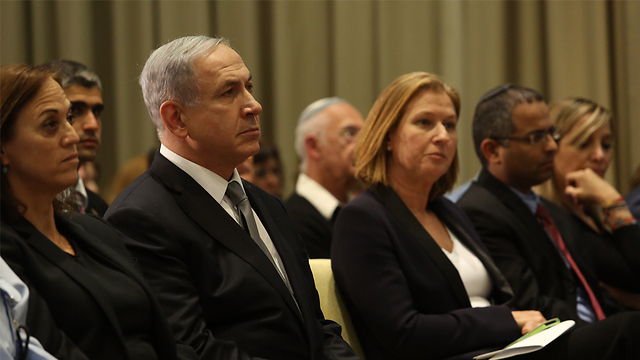
'Israeli voters don’t know if they voted for something or for its complete opposite'
צילום: AFP
Politicians stealing voters' minds
Op-ed: A party leader who reneges on a promise he gave the public must either regain the public's trust or resign.
There is a type of public corruption which is even more poisonous and destructive than the Holyland affair and (alleged) Yisrael Beiteinu affair. I am talking about "stealing" the voter's mind rather than his money, although there is no mention of it in criminal law.

The Likud's supporters gave the party their vote out of a belief that a Palestinian state in the western Land of Israel is an existential national threat, and because they trusted the declared position of their party and its leader.
When the party's leader, the late Ariel Sharon (who became prime minister), suddenly made a U-turn towards a Palestinian state, they tried to understand this changeover on the background of a criminal investigation launched against him ("the Greek island") and said that "the deeper the investigation, the deeper the withdrawal."
His courtiers, or farmers, on the other hand, claimed that he had changed his mind in good faith: "What you see from here is not what you see from there."
In other words, the promise to the voter was made by mistake. But a mistake must be fixed, and just like a person who spends money by false pretense is required to return it, the party and its leader must go back to the voter and ask for a mandate in favor of their new outlook.
But they failed to do that. They took votes intended for the Land of Israel and used them for Palestine. That what we call breach of trust.
This is a badge of shame for our level of citizenship, that in the great struggle against the "disengagement" and expulsion we didn't even think about the critical blow to public morals and democracy.

Netanyahu reneged on his commitment to oppose the land's division. Livni moved between four parties (Photo: Gil Yohanan) (צילום: גיל יוחנן)
The phenomenon repeated itself in the Likud after the Kadima members' departure. In his Bar-Ilan speech and by freezing construction, the prime minister, Benjamin Netanyahu this time, once again reneged on his commitment to oppose the land's division and to nurture the settlements. And once again this shameful phenomenon was met with a shrug.
The violation of promises given to the voter has even become a norm: Immediately after the ballots are counted, the media urges the Likud chairman to launch a "peace initiative," as if it’s a predestination that after the elections the right's leader becomes the left's execution contractor. No one, from top to bottom, never thought it right to apologize for this cancerous phenomenon or to explain it.
And it's spreading. In the Likud, Moshe Kahlon was at the far end of the right. Now we read, "Kahlon: A real Likud knows how to concede land." If he changed his mind so radically, doesn't the voter deserve some kind of an explanation?
With Avigdor Lieberman, the fluctuations have become a well known thing, so the voters don’t feel deceived. They already know what to expect.
Whoever thinks this illness only characterizes the right is wrong. Tzipi Livni moved between four parties, and in the recent move into the Labor Party she tossed away four Knesset members, her entire faction apart from one. Is this the commitment she gave Hatnua's voters?
In 1992, the Labor Party collected votes based on Yitzhak Rabin's promise during a meeting in the Golan Heights: "It is unimaginable that even at times of peace we will withdraw from the Golan Heights. Whoever thinks of withdrawing from the Golan is forfeiting Israel's security!" The elections ended, and Rabin launched negotiations with the Syrians over a withdrawal from the Golan.
And I doubt Labor's supporters would have voted today for the "Rabin legacy," as he presented it in a Knesset speech about a month before his murder: "We want a (Palestinian) entity which is less than a state. A united Jerusalem as Israel's capital, under Israel's sovereignty. A security border in the Jordan Valley, in the widest sense. Settlement blocs, like Gush Katif, in Judea and Samaria as well." This is even more rightist than the Likud leader's stance today.
We must not accept this "Israbluff," in which Israeli voters don’t know if they voted for something or for its complete opposite. We need a law stating that a politician who reneges on a promise he gave the public will be forced to either regain the public's trust or resign.










